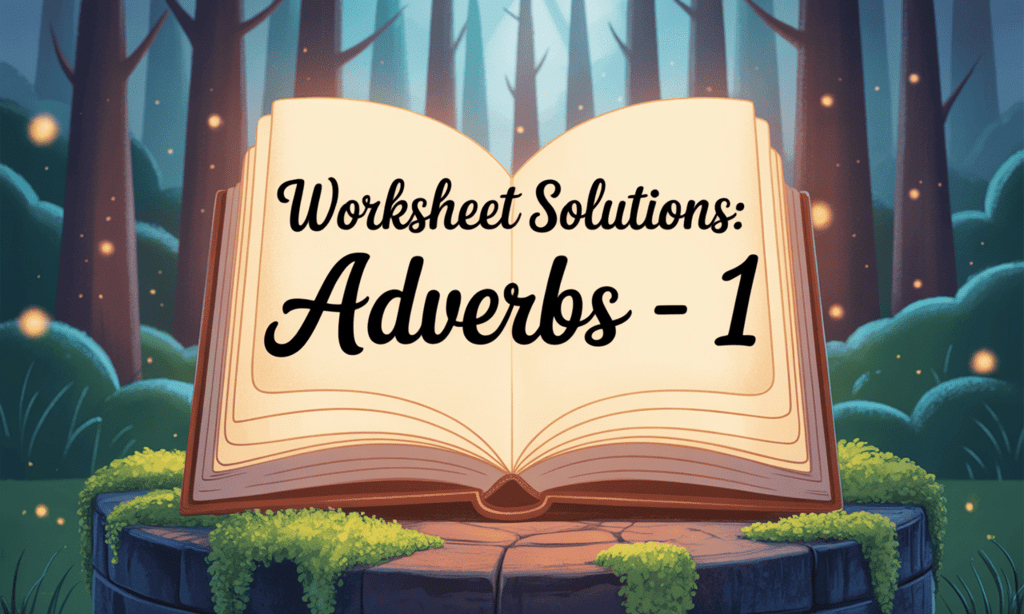Worksheet Solutions: Adverbs - 1 | English Grammar Class 3 PDF Download

Q1: Highlight (Bold) the adverbs and underline the verb they describe.
(i) The cat swiftly caught the mouse under his paws.
(ii) Jenna rides her bicycle well.
(iii) It is snowing outside, so we need to dress warmly.
(iv) Michael completed his homework carefully.
(v) The phone rings constantly at the office.
(vi) Pet the kitten softly if you want it to purr.
(vii) Maria practices her piano regularly.
(viii) The painter delicately adds the final touch to his art.
(ix) Gina nervously twirls her hair.
(x) The cook gracefully spun the pizza dough in the air.
(xi) The referee sternly looked at the players before blowing the whistle.
Ans:
(i) The cat swiftly caught the mouse under his paws.
Explanation: The word swiftly tells us how the cat caught the mouse — it means the cat caught it very fast.
(ii) Jenna rides her bicycle well.
Explanation: The word well tells us how Jenna rides her bicycle — it means she rides it nicely or skillfully.
(iii) It is snowing outside, so we need to dress warmly.
Explanation: The word warmly tells us how we should dress — it means we should wear warm clothes.
(iv) Michael completed his homework carefully.
Explanation: The word carefully tells us how Michael completed his homework — he did it with care and attention.
(v) The phone rings constantly at the office.
Explanation: The word constantly tells us how often the phone rings — it means the phone rings again and again.
(vi) Pet the kitten softly if you want it to purr.
Explanation: The adverb softly describes how the verb pet should be performed, suggesting a gentle or delicate touch.
(vii) Maria practices her piano regularly.
Explanation: The word regularly tells us how often Maria practices — it means she does it again and again on a routine.
(viii) The painter delicately adds the final touch to his art.
Explanation: The word delicately tells us how the painter adds the final touch — it means he does it carefully and gently.
(ix) Gina nervously twirls her hair.
Explanation: The word nervously tells us how Gina twirls her hair — it means she does it when she feels worried or shy.
(x) The cook gracefully spun the pizza dough in the air.
Explanation: The word gracefully tells us how the cook spun the dough — it means he did it in a smooth and elegant way.
(xi) The referee sternly looked at the players before blowing the whistle.
Explanation: The word sternly tells us how the referee looked — it means he looked in a serious or strict way.
Q2: Highlight the adverb that describes the underlined verb.
(i) Baking a cake takes longer than baking muffins.
(ii) The child yawned tiredly at his mom.
(iii) Erika writes neatly in her agenda.
(iv) The police officer listened attentively to the man.
(v) Frank swims better than Ronald.
(vi) This band plays louder than any other.
(vii) This dress fits tighter than the other one.
(viii) Lincoln works harder than his brother.
(ix) They finished their ice cream completely.
(x) The courier arrived later than expected.
(xi) This song ranked highest in the charts.
Ans:
(i) Baking a cake takes longer than baking muffins.
Explanation: The word longer tells us how much time it takes to bake a cake — more time than muffins.
(ii) The child yawned tiredly at his mom.
Explanation: The word tiredly tells us how the child yawned — it means he was sleepy or exhausted.
(iii) Erika writes neatly in her agenda.
Explanation: The word neatly tells us how Erika writes — it means she writes in a clean and tidy way.
(iv) The police officer listened attentively to the man.
Explanation: The word attentively tells us how the officer listened — it means he listened with care and focus.
(v) Frank swims better than Ronald.
Explanation: The word better tells us how well Frank swims — it means he swims in a nicer or stronger way than Ronald.
(vi) This band plays louder than any other.
Explanation: The word louder tells us how the band plays, suggesting the band performs with greater volume than others.
(vii) This dress fits tighter than the other one.
Explanation: The word tighter tells us how the dress fits, describing the comparative manner in which the dress fits compared to another dress.
(viii) Lincoln works harder than his brother.
Explanation: The word harder tells us how much effort Lincoln works with, indicating Lincoln puts in more effort than his brother.
(ix) They finished their ice cream completely.
Explanation: The word completely tells us how much they finished — it means they ate all of it.
(x) The courier arrived later than expected.
Explanation: The word later tells us when the courier arrived — it means he came after the expected time.
(xi) This song ranked highest in the charts.
Explanation: The word highest tells us how well the song ranked — it means the song was number one or at the top.
|
28 videos|165 docs|27 tests
|
FAQs on Worksheet Solutions: Adverbs - 1 - English Grammar Class 3
| 1. What are adverbs and how do they function in a sentence? |  |
| 2. What are the different types of adverbs? |  |
| 3. How can adverbs change the meaning of a sentence? |  |
| 4. Can adverbs be placed in different positions within a sentence? |  |
| 5. What are some common mistakes to avoid when using adverbs? |  |





















